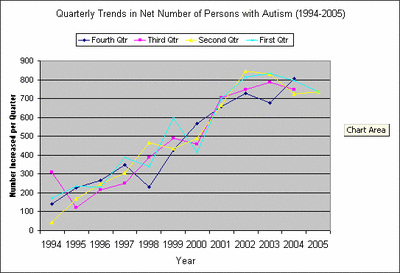Some say the slowdown may be linked to the removal of mercury from infants' vaccines.
By Thomas H. Maugh II
LA Times Staff Writer
July 13, 2005

The number of newly diagnosed cases of autism in California, which had been skyrocketing for more than a decade, has leveled off and may even be declining, according to new data compiled by the state Department of Developmental Services.
Although the total number of autistic children receiving special education services from the state continues to grow ? bringing the current total to 28,046 ? the rate of increase peaked in 2002 and has dropped slightly since then.
The findings are important because California has the best reporting system for autism in the United States and is generally considered a bellwether for the rest of the country.
Experts do not have a good explanation for the slowdown in new cases.
"Perhaps whatever caused [the number of cases] to go up ? environmental insult, or whatever ? is no longer present," said Dr. Robert Hendren, executive director of the UC Davis MIND Institute, which researches neurodevelopmental disorders. "It's all speculation. I wish we had good studies."
Parent activist Rick Rollens of Sacramento, who played a key role in the creation of the MIND Institute, said that the trend roughly corresponds to the removal of mercury preservatives from pediatric vaccines. Many activist groups say that the use of mercury in the vaccines caused the sudden increase in autism cases. Federal scientists, however, have continually said that the evidence does not support such a link.
The state data do not include children under the age of 3. According to the department, about 90% of all autistic children are entered into the system before the age of 6.
That means, Rollens said, that children born since 1999, about the time that mercury was phased out of vaccines, are just now entering the system. The slowdown could thus reflect the change in vaccination practices.
"We can argue till the cows come home about what caused the increase," Rollens said, but the bottom line is that the increase is slowing.
California guarantees access to special education for all children diagnosed with autism and other developmental problems. Thus, the state's data are considered particularly reliable.
According to the state data, 2002 was a record year for new autism diagnoses, with 3,259 cases. In 2003, the number of new cases slipped to 3,125. In 2004, the number was 3,074.
For the first half of 2005, there were 1,470 new cases, compared to 1,518 in the same period in 2004.
"The interesting thing is that, before 2002, every quarterly report had shown an increase over the previous year," Rollens said. "Now, that is no longer the case."
1 comment:
that is wonderful news! too late for some, but at least this issue is getting SOME ATTENTION and validation!
Post a Comment